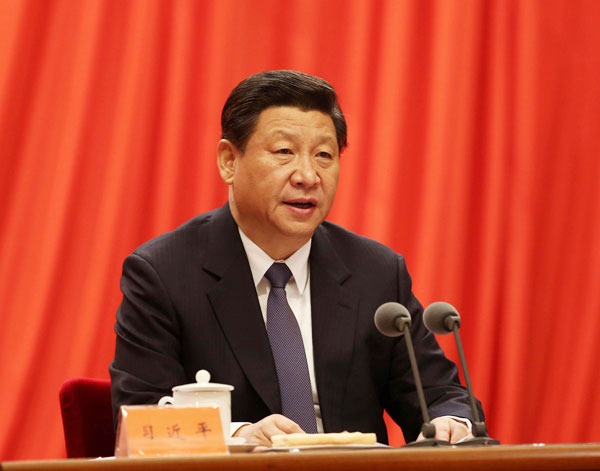 |
|
Chinese President Xi Jinping, also general secretary of the Communist Party of China (CPC) Central Committee and chairman of the Central Military Commission, addresses the third plenary session of the 18th CPC Central Commission for Discipline Inspection (CCDI) in Beijing, capital of China, Jan. 14, 2014. [Photo/Xinhua] |
The report of the 18th National Congress of the Communist Party of China advocated a resolute crackdown on corruption to keep Party members clean and honest. Accordingly, the 18th Central Committee of the Communist Party of China launched a powerful anti-corruption campaign to build upright and diligent Party and society.
Since its founding in 1921 the Party has made fighting corruption one of its significant missions, and with the changing times, the Party's anti-corruption task too has changed. In today's fast-changing world, how to maintain the purity of the Party is a great challenge. But history tells us that corruption has been a constant problem for societies throughout the ages, it is not possible for any party or organization to completely root out corruption from society.
Corruption is the political cancer that all countries and parties suffer from. In recent years, corruption has become a major cause of social contradictions in and political downfall of some countries. The CPC has a clear understanding of the harm corruption can cause to society, which will endanger the future not only of the Party but also the country.
The top leader Xi Jinping has given a call to seriously deal with both "tigers" (high-ranking corrupt officials) and the "flies" (lower-level corrupt officials). And since the 18th National Congress of the CPC, the CPC Central Committee has focused on developing a corruption-free Party and building a clean government, by implementing strict rules for both Party members and government officials.
Following the CPC Central Committee's instruction, the Central Commission for Discipline Inspection has launched an anti-corruption campaign on five major fronts.
First, the CPC Central Committee's "eight-point" guideline has been implemented to fight bureaucratism and formalism, and to do away with extravagance. Second, the Party has adopted zero-tolerance toward corruption, which has led to the punishment of about 750,000 Party members who violated disciplines. Third, the Party has strengthened the anti-corruption mechanism reform to fight graft among officials. Fourth, it has revised anti-corruption laws and regulations to improve institutions fighting graft. And fifth, the Party has deepened international cooperation to fight corruption.
Over the past more than three years, China's anti-corruption cause has made remarkable progress toward building a clean government, and its anti-corruption campaign has won the support of the people.
In last year's National Bureau of Statistics survey on the Party's working style and the building of a clean government, 91.5 percent of the respondents across 22 provinces and regions expressed satisfaction with the anti-corruption campaign, which was 16.5 percentage points higher than that in 2012. And 90.6 percent of them said the anti-corruption campaign had effectively curbed corruption.
The great progress made in the anti-corruption campaign has increased the public's trust in the Party and created a favorable environment for achieving the long-term goals of the Party and the country.
Moreover, the crackdown on corruption has improved China's international image. And some foreign media outlets have even said that Xi's warning against corruption indicates the country's leadership will take stricter measures to punish corrupt officials.
These developments show China's achievements in the fight against corruption have been recognized by people both at home and abroad.
The author is deputy director of the Center for Anti-corruption Studies, University of Science and Technology, Beijing.